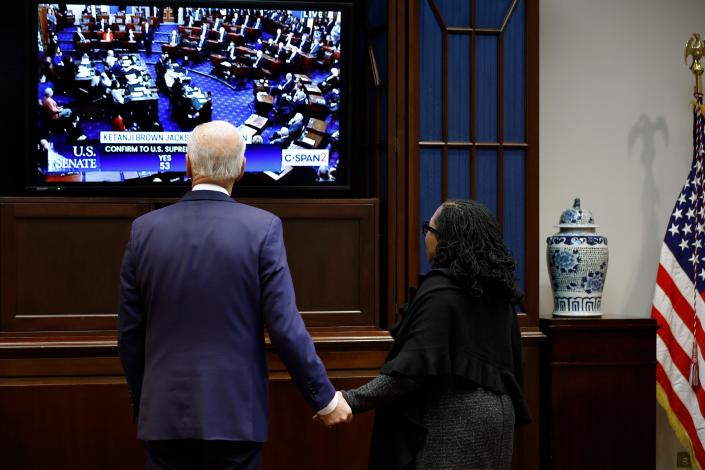WASHINGTON – The Supreme Court was a few minutes into oral arguments in a 2002 case about whether the First Amendment protects cross burnings when Associate Justice Clarence Thomas jumped in – and snapped the courtrooms attention his way.
Suddenly the high courts only Black justice, a son of the Jim Crow South, was questioning whether the all-white panel of lawyers arguing the case to an otherwise all-white bench of jurists was understating the symbolism of a burning cross after nearly a century of lynchings and violence perpetrated by the Ku Klux Klan and others.
“This was a reign of terror and the cross was a symbol of that reign of terror,” Thomas said during an exchange one reporter at the time said drew the rapt attention of the other justices and changed the tenor of the argument – if not the outcome of the case.
Judge Ketanji Brown Jackson’s historic confirmation to the Supreme Court was celebrated Thursday by supporters because she will be the first Black woman justice in the courts 233-year history. What has received less attention is that her ascension marks the first time two African Americans will serve together on the nations highest court – Thomas, a stalwart conservative, and Jackson, who is expected to align more with the courts liberal wing.
It’s also the first time four women will serve on the court together – including three who together will make up its liberal bloc.
Timing: Jackson confirmed in a hurry. Getting on the Supreme Court? Thatll take time.
Trailblazers: For Black women judges, blazing a trail has meant opportunity, scrutiny
GOP criticism: A look at the child porn cases at issue in Judge Jacksons hearings
Jackson’s ascension brings about an end to the notion of a Black seat on the Supreme Court, occupied first by Associate Justice Thurgood Marshall from 1967 until 1991, the year Thomas was confirmed. Jacksons rise also means a broader diversity of views of African Americans – not to mention women, mothers and lawyers who have worked in the criminal justice system – will be represented on the nine-member bench.
That perspective, experts say, will benefit a court that has been overwhelmingly white.
Not all African Americans have the same views. There are differing trajectories along their career and personal paths that will lead to different experiences, said Trina Jones, director of the Center on Law, Race and Politics at Duke Law. Thats why more diversity – more representation – is always preferred, because then youre going to get the full array of perspectives at the table.
Jackson was confirmed 53-47 Thursday by the Senate after a contentious four days of hearings in mid-March during which Republicans peppered her with questions about her judicial philosophy, her stance on political controversies such as critical race theory and her sentencing of people convicted of child pornography charges.
The use of firearms for self-defense was often the only way Black citizens could protect themselves from mob violence, Thomas wrote.
Hes making a very conscious effort to engage race, but to show something that is perhaps counterintuitive – that guns might be good for Black people, I think is his point, whereas the conventional wisdom, is that guns are terrible for Black people, said Melissa Murray, a New York University law professor who has written on the Thomas-Jackson dynamic. I just think its hard to challenge him when hes the only Black person in the room.
One area where the two are almost certain to diverge is affirmative action. The Supreme Court is set to take up that issue later this year in a challenge to admission policies at Harvard University and the University of North Carolina, both of which consider race as one of several factors. Jackson said she intends to recuse from that case because of her role on Harvard’s board of overseers.
Thomas, who is 22 years older than Jackson, has been an outspoken critic of such policies. In a 1995 decision that limited the circumstances under which affirmative action could be used, Thomas wrote that government-sponsored racial discrimination based on benign prejudice is just as noxious as discrimination inspired by malicious prejudice and that such programs stamp minorities with a badge of inferiority.
He very much cares about issues of race, Murray said of Thomas. I just think he believes that, for Black people to thrive, they have to do so in terms that are unmitigated by the largess or benevolence of white people.
Another area where Jackson and Thomas are unlikely to see eye-to-eye is on voting rights. In a series of decisions in 2013 and last year, the high court weakened the landmark 1965 Voting Rights Act, giving states more power to limit access to voting in the name of preventing voter fraud. Thomas joined the majority in both of those decisions, which split cleanly along traditional conservative-liberal wings of the court.
Less clear are the areas where the two may align.
“I’m actually interested to see what their working together might look like,” said Robert Johnson, president of the Black Law Students Association at the University of Chicago Law School, noting assumptions that when it comes to cases with racial implications Thomas and Jackson will be in opposite camps. That might not necessarily be the case in every issue.
Contributing: Mabinty Quarshie, Dylan Wells
This article originally appeared on USA TODAY: Ketanji Brown Jacksons confirmation adds diversity to Supreme Court

